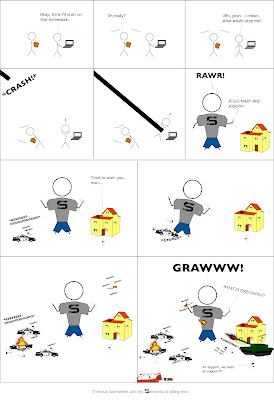
May 20, 2010
May 1, 2010
Apr 29, 2010
Mar 18, 2010
Apr 16, 2009
Wikinography Part 3: Wiki-terms

As this was my first serious foray into Wikipedia, imagine my surprise when I found that I already had a title: wikignome. It was not so much a personal title reserved for myself alone, but more of a class that I belonged to. Wikignoming humorously refers to the authorship of edits perceived to be of an auxiliary (though not insignificant) nature. This kind of activity usually entails formatting, rephrasing or grammar corrections. Due to the minor nature of most of these edits, wikignomes usually do not need to participate in discussion over them. This lack of an active role in debate makes themselves and their part less obvious, which leads to their perceived relationship as tiny elusive beings.
Wikipedia is brimming with this kind of unique and abstruse terminology. After contacting one user, Alastair, he immediately told me that ‘on some level I find Wikipedia to be the ultimate social networking site for the incurably nerdy... however obscure one's interests, there's a real chance one can find others that share them’. I chuckled at this. Not infrequently have I fancied myself a bit of a nerd, which is why I feel no compunction in stating that nerds love jargon.
The most initially intimidating phrases are prefaced by ‘WP’, which I came to find indicates that the entire phrase forms a Wikipedian consensus or guideline. I would also come to discover that this does not, however, imply a stern or even formal subject, such as in the particularly odd example of ‘WP:Beans’. In this case ‘Beans’ refers to the phrase, ‘Don’t stick beans up your nose’, which is a way of saying, ‘Don’t give someone with a naive and adventurous mind any ideas’. The philosophy is derived from a parable about a mother leaving her son at home:
The little boy's mother was off to market. She worried about her boy, who was always up to some mischief. She sternly admonished him, "Be good. Don't get into trouble. Don't eat all the cabbage. Don't spill all the milk. Don't throw stones at the cow. Don't fall down the well." The boy had done all of these things on other market days. Hoping to head off new trouble, she added, "And don't stuff beans up your nose!" This was a new idea for the boy, who promptly tried it out.
Apr 7, 2009
Wikinography Part 2: Wiki - A brief definition
As its portmanteau namesake implies (combining ‘wiki’ with ‘encyclopedia’), Wikipedia is a wiki with the goal of constructing an online encyclopedia.[1] It is by no means the only wiki, and in fact intentions for and varieties of wiki abound, but at the same time it has become the concept’s iconic example. Those who are conceptually unfamiliar with the idea of a wiki are commonly nonetheless aware of Wikipedia, and in many cases Wikipedia has become a descriptive noun; ‘Is that the Star Wars wikipedia?’.
____________________
1. The term wiki is actually originally taken from a Hawaiin word for ‘fast’.
Apr 4, 2009
Wikinography Part 1: Open Sails, At World’s End

There I was, the mouse in my hand as dangerous as any time bomb. I was but a few clicks away from launching ship into the vast recesses of the Wikipedian underbelly. For years I had used Wikipedia idly, mostly in passing as a reference on subjects of straightforward curiosity. But even my use of Wikipedia as an idle reference goes so far back that I can scarcely recall a time I was completely unaware of its existence. I’m nothing exceptional: This is how engrained Wikipedia has become in the lives of many youths. But my relationship with Wikipedia was about to change; concealed beneath the relatively pristine surface of Wikipedia lay the apparatus of an expansive computer-mediated social world, one replete with jargon, unique practices and new imaginings of digital relationship.
In the course of my ethnography I would speak to several editors on Wikipedia while simultaneously taking part in some minor Wikipedia editing myself. Like me, most of the editors I spoke to had initially become aware of Wikipedia as a resource without contributing their owns edits. Even after becoming aware of their ability to contribute, most editors conveyed to me that they had forgone editing for some time thereafter. Unlike me, by the time I spoke to each of these editors, they had become abundantly successful on the English Wikipedia (if not translingually successful). Though it is not an official term on Wikipedia, I use the term ‘prolific editor’, without any hard and fast criteria, to refer to currently active editors with a hefty edit count, in many cases on significant articles.
Nov 12, 2007
The Silent Shineless Future
I am generally unenthused with the state of academia in America. Just ask yourself this question; Why are you in college?
Is it because you so dearly craved knowledge? I think not. If you are in college, the question of, ‘Should I go to college or not?’ probably never arose in your consciousness. It was simply a thing that is done—college is the place you go to get your degree. But why the degree? Is it for the immense pride you anticipated having after you completed your college education? Or was it because you heard the ‘average’ statistic quoted at you, over and over again, throughout the course of your entire god damned childhood?
What is the average statistic?—You’d surely recognize it if you heard it. The formula goes something like this: ‘You know’ or ‘Studies have shown’ that (on average) ‘persons with a college degree make’ supposedly shocking or thoughtful mathematic expression. For instance, “Did you know people who go to college make 18 gijabillion times as much as people who don’t?”
In my head I often respond to such a statement in the following manner: “Really! You don’t say! – Now why is it that you feel compelled to make such a claim, and that you don’t come right out and say, ‘People who go to college are happier’?” No one would like to state it openly, certainly not the speaker in this situation (lest they seem shallow and materialistic). But we all understand what is meant by this, and it’s because in our minds the two are concretely and nearly irreversibly linked with definite certainty.
Of course the person who makes 18 gijabillion times as much is happier! He wears nice suits to work and has a nice home in suburbia where he lives with his sexually appeased wife and two small boys plus his newborn daughter. He drives a nicer car, exhibits greater equanimity and votes regularly!
That chump who didn’t go to college got a dead-end job at McDonald’s and cleans urinals for the rest of his life (or until he decides to put in the “real” hard work of going to college). He struggles his whole life against the soul crushing force of poverty and regrets every day that he did not go to college. His highest appeal is that his kids go to college after all.
Are you listening?! For the love of God, without college you will contract herpes, experience erectile dysfunction and fall into homelessness! Lack of college degree will leave the toilet seat up—it will drink all of your beer!
College is no longer about knowledge – it is about the knowledge industry. There are only two kinds of professors. The first kind, deep down, knows they are no longer the vanguards of your intellectual awakening. In times past, professors were the watchdogs at the gates of society’s intelligentsia, both keeping an eye on those who would enter and, more importantly, the world without. They would call the bullshit from both sides. And were pivotal in society’s operation.
How disturbed would you be if you were reduced from that to being the managers of the knowledge production line? As a student you pass by on your conveyer belt, and they give you passing acknowledgement to make sure you are not so inferior as to cause problems for the factory – that is, that you are not of such inferior quality that you provide a poor reputation for the factory when it comes to the public at large. Harvard: BMW. Community college: Ford. (You pray to God you’re Lexus, or at least Toyota)
Of course it’s not just their job to make sure you don’t make problems for the institution you join after leaving theirs (yet one more in a long line of institutions you will belong to throughout the extent of your life). For what is a problem for them is also a problem for you! Their responsibility is also to you; me, me, me! To make sure you are up to quality specifications not only for your boss in upper-middle layer management, but for you because you are also the customer! We wouldn’t pay tens of thousands of dollars a year (usually going into that figure of debt to make it possible) to be left to the ravages of being unemployable, would we?
The college company gets consumers on both sides. We are not society’s great shining future – we are its mass-product. You are not gaining access to the greatness that is knowledge, we expect access to its material treasure.


